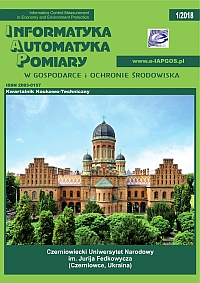ORGANIZATION OF IMPLEMENTATION OF UBIQUITOUS SENSOR NETWORKS
Article Sidebar
Issue Vol. 8 No. 1 (2018)
-
DETERMINATION OF THE EFFICIENCY FACTORS OF THE ABSORPTION AND SCATTERING OF NICKEL NANOPARTICLES
Oleksandr Machulianskyi, Bohdan Babych, Viktor Machulianskyi4-7
-
CONTROL MODEL OF DATA STREAM TRANSMITTED OVER A NETWORK BASED ON PROXYING TECHNOLOGY
Olesia Barkovska, Vitaliy Serdechnyi8-11
-
INVESTIGATION OF THE MEMRISTOR NONLINEAR PROPERTIES
Sviatoslav Khrapko, Volodymyr Rusyn, Leonid Politansky12-15
-
IMITATION MODELING OF THE ROUTING PROCESS BASED ON FUZZY LOGIC
Ivan Lesovoy, Genagij Pylypenko16-19
-
INVARIANT PIEZORESONANCE DEVICES BASED ON ADAPTIVE MULTIFREQUENCY SYSTEMS WITH A PREDICTIVE STANDARD
Sergey Pidchenko, Alla Taranchuk20-23
-
DEVELOPMENT AND RESEARCH OF CRYPTOGRAPHIC HASH FUNCTIONS BASED ON TWO-DIMENSIONAL CELLULAR AUTOMATA
Yuliya Tanasyuk, Sergey Ostapov24-27
-
GENERALIZED APPROACH TO HURST EXPONENT ESTIMATING BY TIME SERIES
Lyudmyla Kirichenko, Tamara Radivilova, Vitalii Bulakh28-31
-
SPECTRAL SENSITIVITY OF HUMAN VISION TO THE LIGHT PULSES
Volodymyr Brailovsky, Ivan Pyslar, Magharyta Rozhdestvenska, Magdalena Michalska32-35
-
ORGANIZATION OF IMPLEMENTATION OF UBIQUITOUS SENSOR NETWORKS
Sergey Toliupa, Yuriy Kravchenko, Aleksander Trush36-39
-
PECULIARITIES OF THE RADIO SIGNALS AND HINDRANCES IN THE NAVIGATION SYSTEM OF THE REMOTE-PILOTED VEHICLES
Mykola Mykyjchuk, Volodymyr Markiv40-43
-
DISTORTIONLESS SIGNALS TRANSFER THROUGH A WIRE MEDIA METASTRUCTURE
Dmytro Vovchuk, Serhii Haliuk, Leonid Politanskyy44-47
-
THE USE OF ARTIFICIAL INTELLIGENCE IN AUTOMATED IN-HOUSE LOGISTICS CENTRES
Tomasz Rymarczyk, Grzegorz Kłosowski48-51
-
USING MICROSERVICES ARCHITECTURE AS ANALYTICAL SYSTEM FOR ELECTRICAL IMPEDANCE TOMOGRAPHY IMAGING
Tomasz Cieplak, Tomasz Rymarczyk, Grzegorz Kłosowski52-55
-
OPTIMIZATION OF DATA PROCESSING FOR REQUESTING OBSERVATION SYSTEMS
Iryna V. Svyd, Andrij I. Obod, Oleksandr S. Maltsev, Daria B. Pavlova, Bridel V. Mongo56-59
-
METHODS OF PRODUCING APODIZED FIBER BRAGG GRATINGS AND EXAMPLES OF THEIR APPLICATIONS
Łukasz Zychowicz, Jacek Klimek, Piotr Kisała60-63
-
DEAD TIME MEASUREMENT BY TWO-SOURCE METHOD – OPTIMIZATION OF MEASUREMENT TIME DIVISION
Grzegorz Domański, Bogumił Konarzewski, Robert Kurjata, Krzysztof Zaremba, Janusz Marzec, Michał Dziewiecki, Marcin Ziembicki, Andrzej Rychter, Waldemar Smolik, Roman Szabatin, Piotr Brzeski64-66
-
ANALYSIS OF THE BENDING STRAIN INFLUENCE ON THE CURRENT- -VOLTAGE CHARACTERISTICS OF HTC SUPERCONDUCTING TAPES
Jacek Sosnowski67-70
-
DETERMINATION OF R = F(T) CHARACTERISTICS OF THE FIRST AND SECOND GENERATION SUPERCONDUCTING TAPES
Rafał Kwoka, Janusz Kozak, Michał Majka71-74
Archives
-
Vol. 10 No. 4
2020-12-20 16
-
Vol. 10 No. 3
2020-09-30 22
-
Vol. 10 No. 2
2020-06-30 16
-
Vol. 10 No. 1
2020-03-30 19
-
Vol. 9 No. 4
2019-12-16 20
-
Vol. 9 No. 3
2019-09-26 20
-
Vol. 9 No. 2
2019-06-21 16
-
Vol. 9 No. 1
2019-03-03 13
-
Vol. 8 No. 4
2018-12-16 16
-
Vol. 8 No. 3
2018-09-25 16
-
Vol. 8 No. 2
2018-05-30 18
-
Vol. 8 No. 1
2018-02-28 18
-
Vol. 7 No. 4
2017-12-21 23
-
Vol. 7 No. 3
2017-09-30 24
-
Vol. 7 No. 2
2017-06-30 27
-
Vol. 7 No. 1
2017-03-03 33
-
Vol. 6 No. 4
2016-12-22 16
-
Vol. 6 No. 3
2016-08-08 18
-
Vol. 6 No. 2
2016-05-10 16
-
Vol. 6 No. 1
2016-02-04 16
Main Article Content
DOI
Authors
Abstract
The article deals with the implementation of one of the most promising technologies of the 21st century – the permeable sensor networks of the USN. The features, architecture, organization and routing algorithms of sensory networks are described. It is determined that further improvement of the work of such networks requires standardization of the development process and implementation process. USN's Vertical Sensor Networks is one of the most promising technologies of the 21st century. Cheap and "smart" sensors, in large quantities combined into a wireless network connected to the public communications network, today provide an unprecedentedly wide range of control and management services for buildings, businesses, cars, and so forth. USN networks, depending on the type of sensors, can be deployed on the ground, in the air, under and over water, in buildings and, finally, on the skin and inside living organisms, including humans. They are also widely used in such important areas as military affairs, crisis and emergency management, and the fight against terrorism.
Keywords:
References
Akyildiz I.F.: Key Wireless Networks Technological in the Next Decade. NEW2AN 2006, St. Petersburg, Russia June 2006.
Berkman L.N., Tolupa S.V.: The architectural concept of construction, the principle of implementation, the efficiency of the application of intelligent telecommunication network. Problematic sciences works of VITI NTUU-KPI 3/2007, 9–17.
Burov E.: Computer networks. Baku, Lviv 1999.
Golishko A.: IMS: useful recommendations. CONNECT 5/2009, 2–6.
Retana A., Slice D., Ras U.: Principles of Designing Corporate IP Networks. Williams Publishing House 2002.
Steklov V.K, Kilchytsky Ye.V.: Fundamentals of management of networks and telecommunication services. Technique, Kiev 2002.
Tikhvin O.V., Terentyev S.V.: SV LTE mobile communication networks and architecture. Moscow, Eco-Trend Publishing House 2010.
Ujukha T.: Prospects of SDN on a telecom. Market. Technologies and media 2(107)/2015, 52–54.
Article Details
Abstract views: 363
License

This work is licensed under a Creative Commons Attribution-ShareAlike 4.0 International License.






